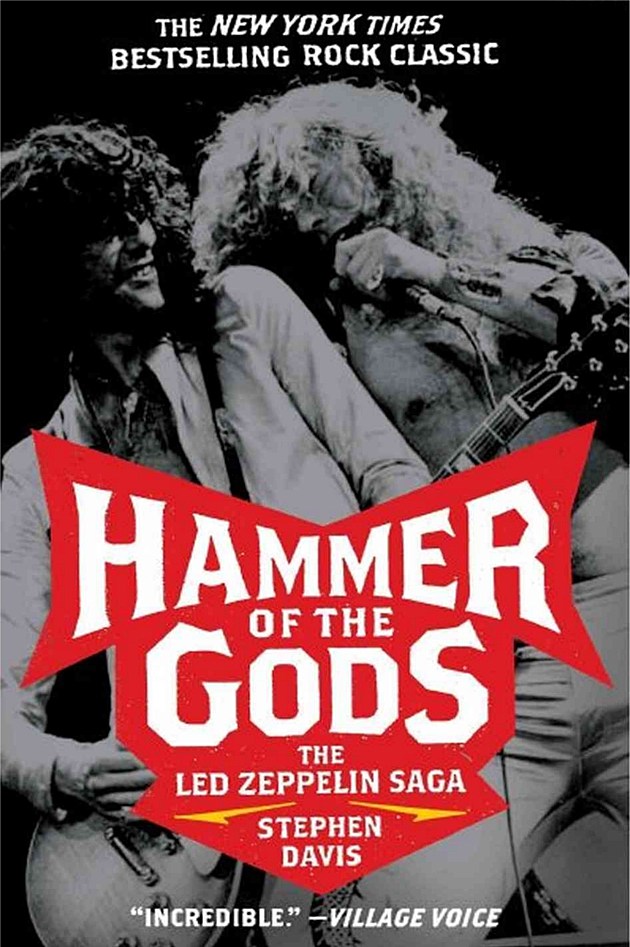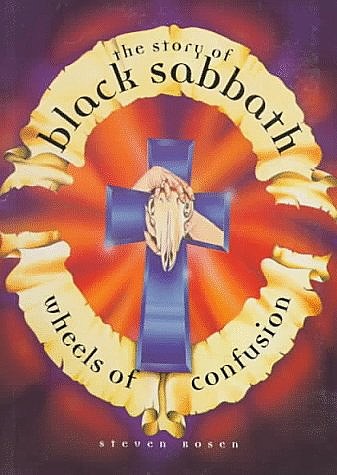
Book Club: Hammer of the Gods / Wheels of Confusion

…
Bring on your insight; bring on your trash! Here at the Invisible Oranges Book Club, I don’t discriminate. There is plenty of good writing about metal, and (as metal.txt can tell you) an awful lot of bad. Together, we’re going to read all of it, or at least everything languishing on paperback shelves between used copies of KISS autobiographies. Hell, we’ll probably get around to those as well.
We begin with Hammer of the Gods: the Led Zeppelin Saga by Stephen Davis, chronicling both the birth of heavy metal and hilariously lurid writing about it. This book is canon, the kind you’ve heard about even if you’ve never read it; even if you don’t read, for that matter. Davis chronicles the transformation of a bunch of Lord of the Rings-loving nerds into gods. However, he is more than a simple scribe, he is a bullshit magician. In writing Hammer, Davis actually transforms the band himself. This is the birth of rock and roll mythology.
Hammer has the tone and style of a really good bar story told by someone too drunk to remember most of the details, so they invent new ones. Davis was unable to interview any original members of Zeppelin for the book. Instead, he relied on old articles and increasingly ridiculous sources. We hear from roadies, managers, and, extensively, groupies; the kinds of fame-obsessed hangers-on more likely to place themselves in the center of stories about other, more important people. Roadie extraordinaire Richard Cole receives significant real estate throughout Hammer, seemingly because he was willing to talk to Davis. We get multiple stories about Cole’s sex exploits, details so apparently vital to the story of Led Zeppelin that Davis includes all of them.
Davis isn’t a particularly good writer, a quality that doesn’t stop Hammer from being an awesome book. He describes Zeppelin concerts as, alternately, “wargasms,” “Dionysian fiestas,” “a private covenant of sheer mystique,” and “Mardi Gras, Saturnalia, and Chinese New Year in one rock show.” He insists on describing every detail of bootlegs he’s listening to, and even the sound of each song on Zeppelin’s records, as if anyone reading a book about the band might be unfamiliar with their music. He italicizes seemingly random words, letting us know that Led Zeppelin “had the power” and that it could get way with “anything,” that they liked to “just hang out” at bars. Groupies were always “blatantly coming on to them.” He treats “homage” like a foreign word and insists on referring to John Bonham as “Bonzo” even in the section about his death.
Where Davis succeeds is delivering the goods, if by the goods you mean endless orgies and rumors about said orgies. We get two separate descriptions of the shark story (you know which one), learn about a woman named “Dahlia the Dog Act” who was accompanied by an apparently pretty bored Great Dane, and lots of Caligula-level debauchery. According to Davis, “for some reason food and sex were inextricably linked in the band’s mind.” Cue John Bonham having baked beans and beef entrails dumped over him mid-coitus. Can you imagine a greater fuck you to the starving people of the world? If you can, I’m sure Zeppelin did that, too.
My favorite sections of Hammer all involve Jimmy Page, who is alternately described as a quiet, demure, Crowley-reading romantic and a whip fetishist who sexually pursues 14-year-old girls. Where John Paul Jones is barely in the book and Robert Plant and John Bonham come across as a little dumb, Page attains some depth, first as a skiffle-playing youngster, and later as an unstable star. If everyone else gets a single trait, Page gets at least two, as musical savant and creepy pervert. For instance, he has roadies capture Lori Maddox, who Davis queasily describes as “a prepubescent Bianca Jagger.” Maddox says she and Page “fell like in love,” and Page would send a driver to pick her up whenever he was in LA, and because he was afraid of being deported for, and let me emphasize this, carrying on a sexual relationship with a 14-year-old, he kept her locked up in his room at all times. She describes this as “like romantic.”
Echoing the Klosterman quote, Davis seems mostly interested in flattering Zeppelin, rather than analyzing them. To this end he completely internalizes the anti-press paranoia that Zeppelin lived in at all times, relishing each time Rolling Stone trashed the band, pointing out just how wrong the magazine — and indeed all critics of Zeppelin, holy of holies, most golden of gods — got it. It all leads to this beautiful, beautiful quote on dueling Zeppelin/Rolling Stones tours: “While Mick Jagger’s stunning, glamorous Nicaraguan wife was courted as an avant-garde sultana, Jimmy Page was trying to hide his fourteen-year-old concubine from the law. It was ridiculous.” Oh the indignity!
In Davis’s mind Zeppelin are just some lads trying to have some fun, when they aren’t uplifting the entire musical form. In the introduction (excuse me, ‘Overture’) Davis describes the life of violinist Niccolo Paganini, “whose career,” he says, “has been compared to Led Zeppelin’s.” Yes, Paganini, one of the most famous musicians who ever lived must be compared to Zeppelin in order to have any historical relevance whatsoever. And can this scum-sucking ‘artist’ hold a candle to thee mighty Led Zeppelin? Consider whose biography you’re currently reading for that answer.
Hammer of the Gods is not an especially good book, particularly if you’re looking for insight into the workings and mindset of Led Zeppelin. [Ed. note: Or accuracy.] The less debauched the band becomes, the more boring the book, to the point where the last 50 or so pages are a total slog. Hammer earns its place in the pantheon of rock books not for being one of the first, like Mystery Train, or most enlightening, like Our Band Could Be Your Life, but because it’s totally batshit, the equivalent of a raised lighter or throwing the devil’s horns. Check your brain at the door.
…

…
Beginner’s bonus: Wheels of Confusion: The Story of Black Sabbath by Steven Rosen
My favorite story about Black Sabbath comes from their formation. Ozzy Osbourne’s parents bought him a PA to keep him out of jail, reasoning that if only he had something to do at night could they dissuade him from a life of crime. He would invite musicians over to his garage to jam, and out of these bluesy practices came Black Sabbath. I love this story because it posits the most important metal band of all time as a sort of D.A.R.E. program; Just Say No directed at one dumb kid from Birmingham.
This story is nowhere to be found in Wheels of Confusion.
Rosen has the exact opposite problem from Davis: he has incredible access, interviewing all four original members of Sabbath without extracting anything of meaning from them. Wheels is a totally boring book with a very confusing structure. It reads like a bad newspaper article, with Rosen letting quotations compose about 75 percent of the material. At one point, Ozzy and Geezer Butler go on about their newest solo albums circa 1995. The band’s reunion is openly discussed in the chapter on Paranoid. And worst of all, Rosen extensively quotes Bill Ward, officially the least interesting member of any classic metal band. Take his exhilarating description of the band’s influences: “We were all kind of into the blues.” As one Amazon review notes: Ward “was on drugs for most the 1970s. How reliable of a source is he? Maybe that explains the lack of details.” I like this explanation, and I’m sure Rosen does too, because he’s turned a book about a bunch of blue-collar occultists into something I wrote for my college newspaper my sophomore year. I’d blame everyone else too if that were the case.
Though reading Wheels inspired me to listen to this song again, so it can’t be all bad.
Now it’s your turn. Have any books I should cover? Any rock star stories? Opinions on the books I’ve covered? Explanations of just how stupid I am? Leave them in the comments, and let’s read together!
…











